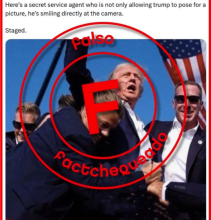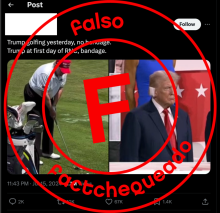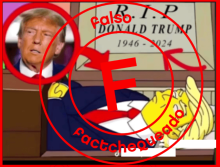In the wake of the assassination attempt against former U.S. President and current Republican presidential candidate, Donald Trump, mis- and disinformation is rampant — and Spanish-language falsehoods are no exception.
Factchequeado, a collaborative initiative aimed at combating Spanish-language disinformation in the U.S., has been working around the clock to expose the lies being shared on social media about last weekend’s shooting. Co-founded by ICFJ Knight Fellow and former Chequeado CEO Laura Zommer with Maldita.es CEO Clara Jiménez Cruz, Factchequeado has an expansive network of more than 90 partners (60 media outlets and 34 NGOs) debunking lies targeting Spanish speakers in the U.S. – a community that is highly vulnerable to disinformation, in part because they are more likely to get their news from social media.
Almost immediately after initial reports broke of shots fired at the Trump rally, “all of the team offered to work,” according to Zommer. After publishing their own objective explanation of the Pennsylvania rally shooting, the Factchequeado team began addressing rumors that were already circulating in the Spanish-language social media space.
“In less than 12 hours all of the usual disinformers’ techniques were on the scene: manipulated photos or videos, out-of-context pictures, conspiracy theories and more,” Zommer explained. “We didn’t find ‘deep fakes’ or sophisticated AI-created content. This time ‘cheap fakes’ were enough. The shocking breaking news event and the general uncertainty that it brings — not only for the United States, but for the whole globe — were the perfect scenario for disinformation to flourish.”

One of their first fact-checking efforts exposed deception behind an image being shared on X (formerly Twitter) that depicted U.S. Secret Service agents smiling while protecting Trump from the attack — a detail that some are claiming as evidence for the attack being staged. Using a reverse Google image search, Factchequeado found that the original image, taken by AP photographer Evan Vucci, shows the agents with serious expressions. Then, upon forensic analysis of the image, they discovered that the picture had clear evidence of manipulation on the faces of the agents, rendering it false.

Another post went viral on X claiming that Trump was golfing without a bandage on his ear the day before the Republican National Convention, where he publicly appeared with a bandage protecting his gunshot wound. Factchequeado, however, proved that this image dates back to at least May 8 — months before the attack. The original post alone had over 1.7 million views, exemplifying how quickly misleading content can spread.

An additional piece of disinformation that Factchequeado debunked were claims that the popular animated TV show, “The Simpsons,” predicted the assassination attempt against Trump. Images circulating on TikTok, which have garnered hundreds of thousands of views, show the former president in a coffin, some with signs that read “R.I.P Donald Trump 1946-2024.” Using the same reverse Google image search tactic, Factchequeado found that multiple versions of the image have been circulating since 2017. Matt Selman, executive producer of “The Simpsons,” also stated that “the image of Donald Trump in a coffin has never appeared in ‘The Simpsons.’ It was manipulated.”
Zommer shared that “mass shootings are not as frequent in Latin America as in the U.S., so explaining more about this particular phenomenon is crucial to avoid anxiety and fear.” To this aim, Factchequeado published a series of articles that provide additional context for the shooting, such as how the U.S. Secret Service works, the history of U.S. presidential assassination attempts and statistics on mass shootings, as well as how to deal with mental health challenges after a traumatic event. In this way, Factchequeado works to fill the gap of reliable information written in Spanish.
Additional examples of Factchequeado's coverage of the recent assassination attempt can be found on their website.
A Larger Mobilization Around the U.S. Elections
The organization’s tireless coverage of this attack is only one facet of their larger mobilization around the 2024 U.S. election. Last month, Factchequeado partnered with PolitiFact to deliver live fact-checking of the first presidential debate in Spanish. The day after, they continued working with Maldita to analyze the debate, taking advantage of the different time zones.
Recently, they also launched the first-ever Media Literacy Course in Spanish for WhatsApp — a free, seven-day course with the goal of educating their Latino and Spanish-speaking audiences on fundamental media literacy concepts ranging from identifying misinformation to understanding the role of artificial intelligence. For journalists, they launched a bilingual toolkit that shares strategies for covering Latino and Spanish-speaking communities in a way that combats mis- and disinformation, biases and prejudices.
In the lead up to election day, they plan to launch a conversational electoral chatbot in Spanish for WhatsApp, replicate and bolster their live fact-checking for the second presidential debate and have collective streaming available as voting unfolds on Nov. 5.
With the U.S. ranked as the fifth-largest Spanish-speaking country in the world, the role that Factchequeado plays in delivering trusted Spanish-language journalism and fact-checking cannot be understated — especially in this historic political moment. Monica Lopez, program manager for the ICFJ Knight Fellowships, praised Factchequeado, saying, “Through their efforts, Factchequeado promotes transparency, accountability, open data and a stronger public debate which in turn strengthens democratic values and challenges disinformation. And in this work, Factchequeado has become a pillar of reliability for their wide Latino and Spanish-speaking audience.”